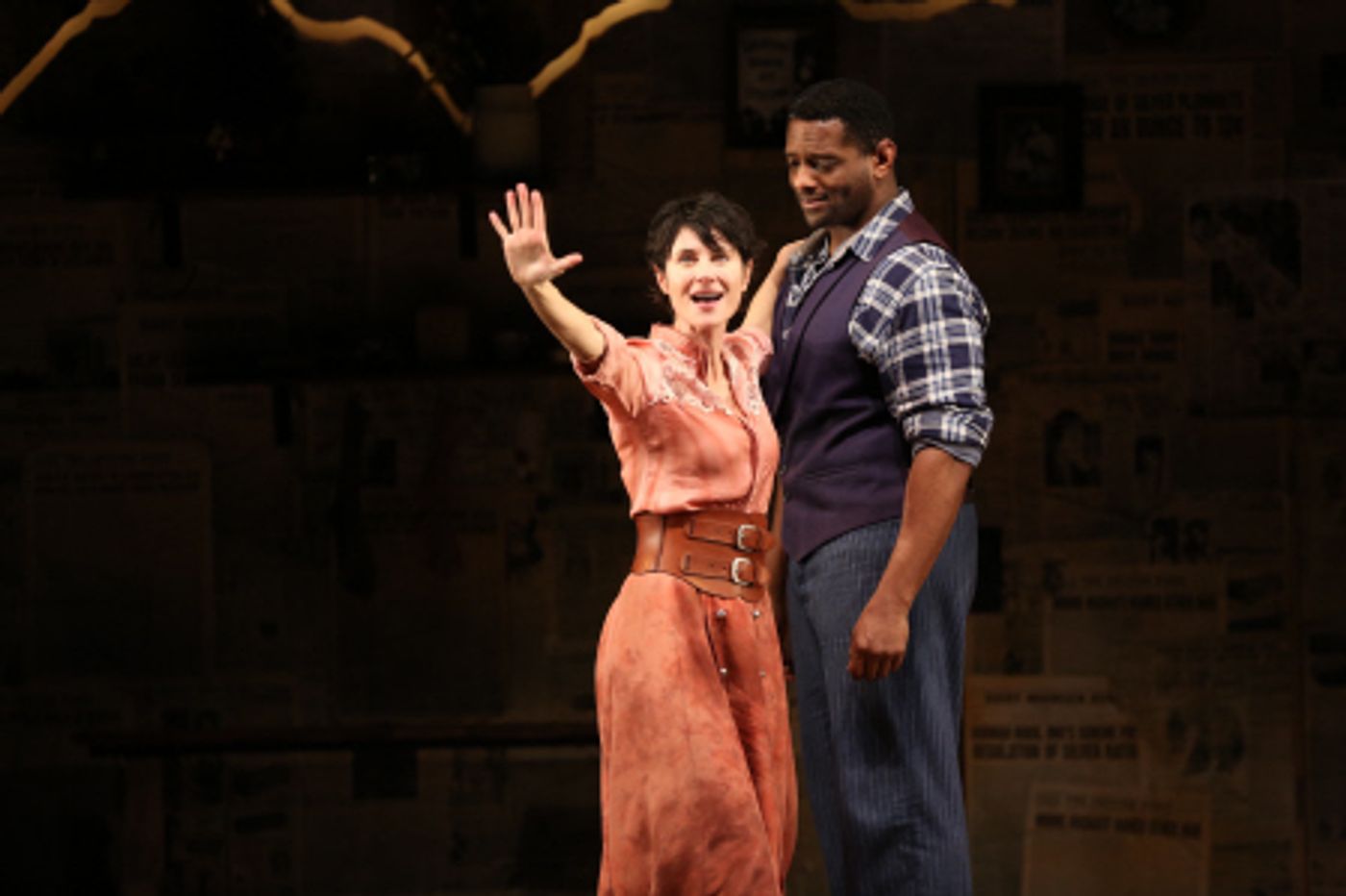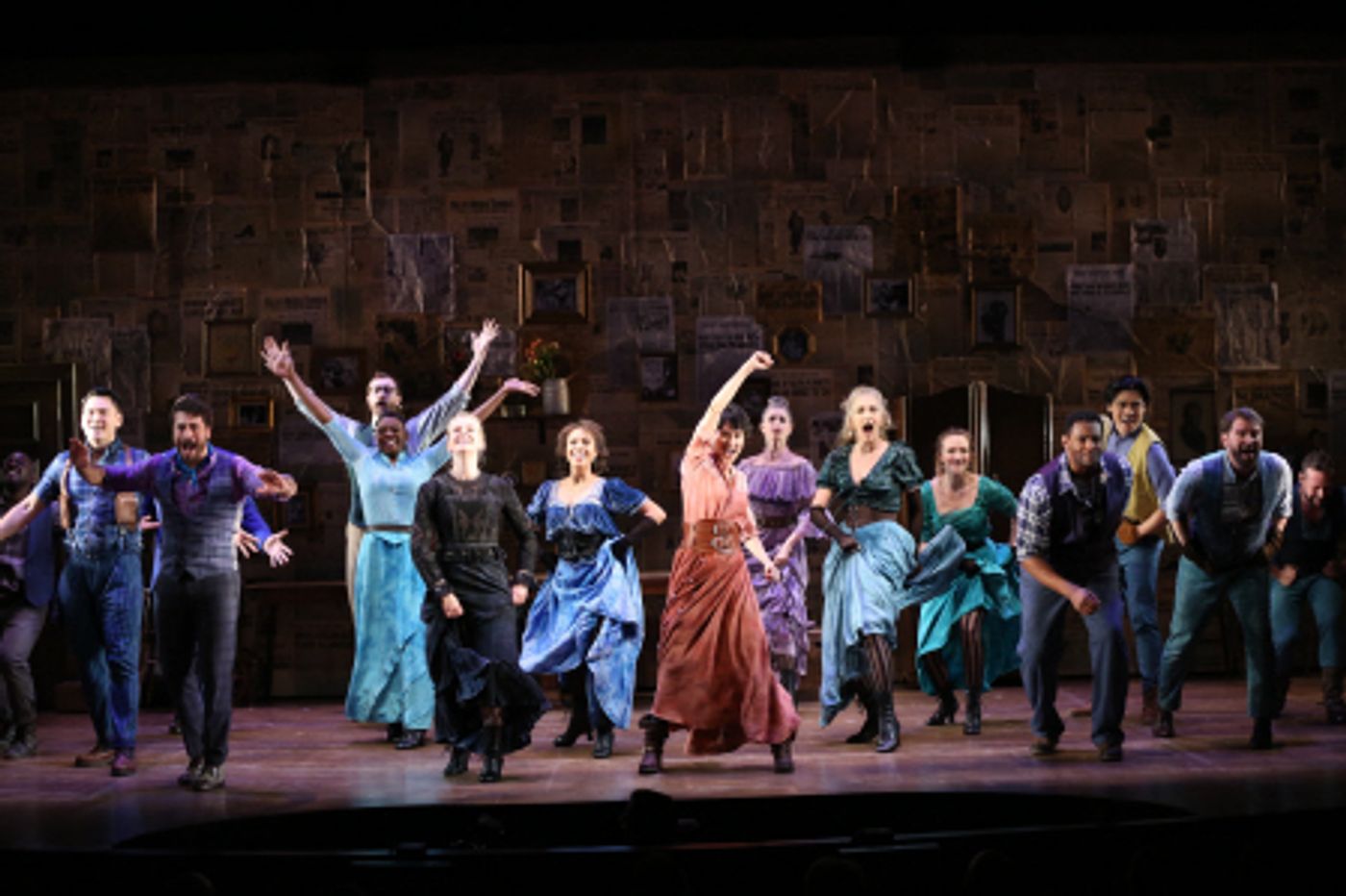Review: Beth Malone Grandly Skippers New Progressive-Minded Musical Vaguely Resembling THE UNSINKABLE MOLLY BROWN
Dick Scanlan pens a completely new book for 1960 Broadway hit.
"Revitalized" is the new euphemism for "about 80% rewritten", or at least it appears that way in regards to the new musical that carries the name The Unsinkable Molly Brown.

(Photo: Carol Rosegg)
But give credit to the lively, fun and decidedly progressively-minded show that Transport Group has docked at the Abrons. Unlike recent Broadway revivals like CAROUSEL and KISS ME, KATE that don't make it clear to ticket-buyers how extensively the work of their deceased authors has been rewritten, it's prominently stated in the credits that Dick Scanlan has provided a new book - seriously, a completely new book - based on Richard Morris' original from the hit 1960 vehicle that made Tammy Grimes a Tony-winning Broadway star.
(Side note: In a season loaded with famous women starring in musicals, the lesser-known Grimes, along with the lesser-known star of BYE, BYE, BIRDIE, Chita Rivera, were placed in the supporting actress category. Their co-nominee, Nancy Dussault from DO RE MI, was the only true supporting player in the mix.)
A program insert details which of the evening's song are being presented as composer/lyricist Meredith Willson wrote them for the original production (including the signature Willson march, "I Ain't Down Yet" and the rowdy drinking chorus "Belly Up To The Bar, Boys"), which are additions taken from the Willson catalog (some with lyric revisions to fit the story) and which songs are made up of Willson melodies granted brand new Scanlan lyrics. Michael Rafter is billed as having adapted Willson's music and conductor Joey Chancey heads a nine-piece orchestra playing Larry Hochman's new orchestrations.
Setting aside the issue this reviewer always has with the practice of rewriting the work of deceased playwrights, Scanlan's concoction is significantly stronger than the original; a pretty lightweight Cinderella story suggested by the real life of the Titanic-surviving title character who went from a poor childhood to become one of Denver's leading philanthropists.
As scripted by Morris, Molly Tobin meets her future husband, Johnny "Leadville" Brown, after teaching herself how to play the piano in one night in order to get a job entertaining at a saloon in the silver mining town of Leadville, Colorado. After Johnny's luck earns them a quick fortune, the major issue of the musical is Molly's dream of being accepted by the wealthy elite of Denver versus his desire to just live life being themselves.
Scanlan dumps those plot points and deepens their relationship significantly. After a non-musical opening scene that presents a now-familiar depiction of a woman having the truthfulness of her testimony doubted by a panel of United States Senators, the new version flashes back to scrappy young Molly Tobin resisting the pleas of frightened male employees of the Horace Tabor Mining Company, who insist she respect their belief that having girls (their word, not mine) anywhere near a mine is bad luck.
When a coincidental accident does kill a miner, the guilt-ridden Molly pays her respects to his pregnant widow and offers her help. The widow offers some homeschooling in exchange. James Joseph "J.J." Brown, who in this version is the mining company's manager, visits every day and assists financially, and the attraction between these two good-hearted, strong-willed people whose personalities and views often clash grows and flourishes.

(Photo: Carol Rosegg)
After a government switch from silver standard to gold threatens to destroy the Leadville economy, the combination of J.J.'s ingenuity and Molly's moxie earns the couple a fortune, which Molly uses to create social programs benefiting the poor, including impoverished students, prostitutes and refugees, as well as backing the suffragette movement. J.J. consistently shows support and admiration until she sides with the formation of a miners' union.
Played by a cast of sixteen in the Abrons Arts Center's small auditorium, director/choreographer Kathleen Marshall's rip-roaring production bursts from the stage, pushing the text's modern ideas through brash, Golden Age showbiz exuberance. Her muscular dance routines match the hearty pioneer spirit of the story and the whole production looks like a miniature Broadway musical that can easily be expanded for an uptown move.
At the center of it is a grand and gutsy star turn by Beth Malone, who belts with abandon and plays Molly with a convincing mix of boldness and compassion. The tone of the show paints Molly as a legendary figure and Malone is up to the challenge of portraying a heroic role model.
A major key in making the show work is David Aron Damane's heart-melting portrayal of J.J. as a strong, responsible man who, though always respectful of Molly, has a pragmatic nature that is often at odds with her impulsiveness. This reviewer heard audience members audibly swooning over his smooth and noble baritone, as well as his sincerity when the character displays romantic thoughtfulness.
Adding greatly to the fun and emphasizing the role of immigrants in the American westward expansion, are Alex Gibson, Omar Lopez-Cepero and Paolo Montalban, playing a rambunctious trio of miners from Germany, Italy and China.
With a lobby desk offering visitors voter registry forms and a closing scene suggesting that Americans "be calm" and "never settle" because the country "ain't down yet," one can sense an unstated message supporting political upheaval in the air. And if this new version of The Unsinkable Molly Brown seems to present its title character as a musical comedy stand-in for at least one current presidential candidate, well, it wouldn't be the first time a catchy tune helped sway the ballot box.
Reader Reviews
Powered by
|
Videos

